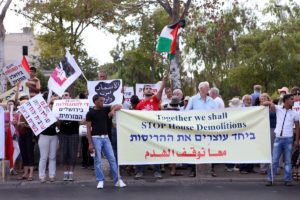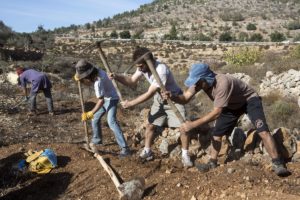Minds of the Movement
An ICNC blog on the people and power of civil resistance
by Leonie FleischmannAugust 01, 2018
Imagine this scenario: A civil resistance campaign emerges in your country. You agree with the goals of the resistance, but you are not the one facing oppression. In fact, in many ways you are complicit in upholding the regime of oppression. What do you do? How can you help the resistance campaign? These questions arose during the time I lived in Jerusalem between 2009 and 2010 and subsequent visits to Israel and Palestine in 2013, 2015 and 2018, during which I observed a range of nonviolent demonstrations and interviewed over 100 Israeli and Palestinian activists.
The question of assistance often emerges when considering how we can help civil resistance campaigns across the world—how we can act in solidarity with those facing oppression. The question is less common when thinking about those who are part of the ruling group or would be upholding the regime of oppression if complacent. Given their origination from the oppressor’s camp, it would help our understanding of civil resistance more broadly to look at how this particular group helps—or hinders—nonviolent campaigns.
The example of Israeli-Jewish activists who physically join Palestinians in their nonviolent resistance campaigns is useful in exploring this question. In some examples, they are integral to the success or continuation of a campaign. However, in other cases, they have been seen to hamper the potential of a campaign to achieve its goals. Tracing how and why they are helpful in some instances and not in others will provide some tips for activists who find themselves in similar positions.
Three examples of Israeli-Jewish involvement in Palestinian nonviolent resistance

Palestinians, Israelis and internationals demonstrating together holding a banner against house demolitions in Jerusalem during the weekly demonstration in Sheikh Jarrah against the evictions of Palestinian families, East Jerusalem, August 6, 2010. Source: ActiveStills.org, with permission.
A wave of Palestinian nonviolent resistance, ‘The Popular Struggle Against the Wall’, emerged in 2003 in various villages in the West Bank that were affected by the Wall that Israel began to build, which runs east of the 1948 Armistice Line and appropriates Palestinian land. Israeli activists joined, and continue to join these struggles, traveling to nonviolent demonstrations on a weekly basis to confront the Israeli Defense Forces. From conversations I had, most of these activists were aware that they were attending as guests of the Palestinians and that the struggle would have continued without them. Their presence was valued because it stopped the Israeli army from using live ammunition against the demonstrators and empowered the Palestinians to be more confrontational. Strong relationships were built between the Palestinians and the Israelis, to the extent that they believed themselves to be part of a family, resisting against the Israeli forces together.
Another successful example of Israeli-Jewish assistance involves various efforts since the early 2000s to resist displacement and harassment of Palestinians in Area C of the West Bank, which is under Israeli military control. Israeli activists accompanied, and continue to accompany Palestinian farmers and shepherds to assist them in accessing their land, herding their sheep, and harvesting their olives. Resistance efforts that have been developed through long-term and daily commitment have been successful in enabling the Palestinians to maintain their daily routines. A group called Ta’ayush: Arab Jewish Partnership has been particularly effective in enabling this model.

Israeli solidarity activists work on the land of a local Palestinian farmer, located on the other side of the route of the Separation Wall in the West Bank village of Al Walaja, November 23, 2013. Source: ActiveStills.org, with permission.
In contrast with the two previous examples, the following episode highlights the problems that arise when those who are not the ones facing oppression dominate the struggle. A campaign against the evictions of Palestinians from their homes in an East Jerusalem neighborhood called Sheikh Jarrah began in 2009. Initially some committed Israeli activists joined Palestinians in their efforts to nonviolently resist eviction. Some other Israeli activists saw an opportunity to create something big and took over the campaign. They succeeded in mobilizing the largest number of Israelis in solidarity with Palestinians. However, they were criticized for taking over and imposing their own ideas of how the campaign should be run and what the goals were. As a result, the campaign fractured and demobilized, and the threat of evictions re-emerged.
Privilege: A blessing and a curse
The concept of ‘privilege’ can be used to understand the dynamics in each of these cases. The Israeli-Jewish activists come with a certain level of privilege that is afforded to them simply because they are Israeli-Jews, often wealthier and more educated than the Palestinians they seek to help. This privilege often leads them, while not ill-meaning, to speak on behalf of the Palestinians, to make decisions for them, and to determine what is ‘best’ for them. As a result, they end up reinforcing the very dynamics they seek to disrupt. They must therefore never take the lead in a campaign or instruct the Palestinians on what to do.
At the same time, it is because of their privilege that they are able to assist the Palestinians. They are likely to be treated more humanely than a Palestinian if detained. They are able to be more confrontational toward soldiers. They are able to go home to a safe environment to recover after an exhausting, perhaps traumatic demonstration. Palestinian activists are not so fortunate. Thus, the presence of Israeli-Jews can help in protecting the Palestinians, negotiating against their arrest with the soldiers, and encouraging the Palestinians to keep struggling, even when efforts seem futile.
Galtung argues that “it is not obvious that nonviolent resistance against an oppressor is primarily the task of those who are oppressed.” Strong movement allies, such as the Israeli-Jewish activists, can be integral to the success of a campaign. At the same time, it is unclear how, concretely, those who are not oppressed should engage in nonviolent resistance, particularly when on the ground. If they dominate the campaign, then they actually lose the agency they may have had to help the campaign. Only if they are aware of their own privilege, follow the lead of those under oppression, and develop strong, committed relationships, can they truly assist a civil resistance campaign.

Leonie Fleischmann
Dr. Leonie Fleischmann is a Lecturer in International Politics at City, University of London, where she Directs the Postgraduate Program in Human Rights. She is also a 2017-2018 Research Fellow with the International Center on Nonviolent Conflict.
Read More